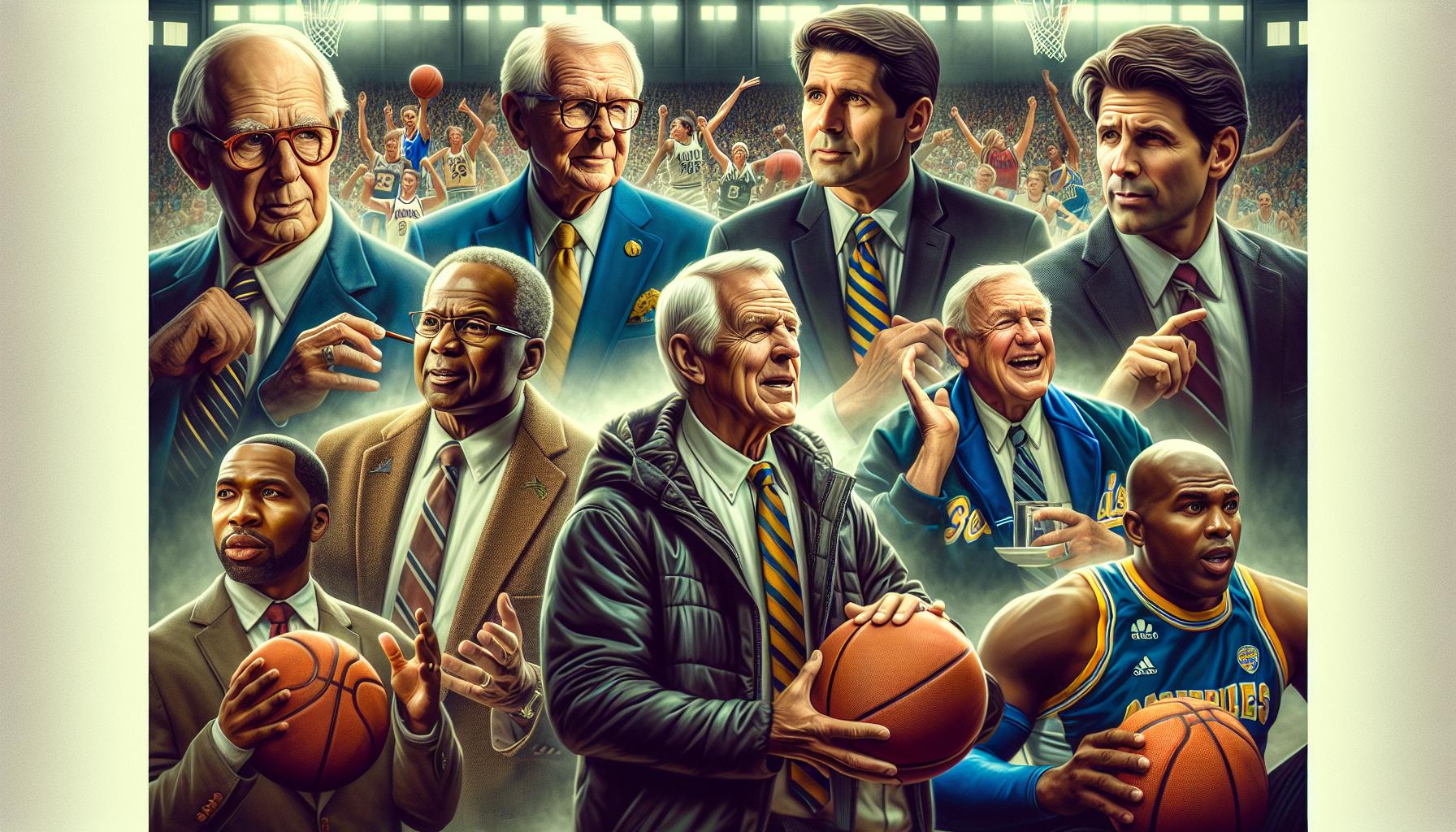
In the world of college basketball, few figures shine as brightly as the legendary coaches who shape the game. These individuals not only strategize plays but also inspire athletes to reach their full potential. Their influence extends beyond the court, molding character and instilling discipline in young players who aspire to greatness. From iconic figures like John Wooden to contemporary legends such as Mike Krzyzewski, these coaches have left an indelible mark on the sport. They’ve built dynasties and transformed programs into powerhouses, earning respect and admiration from fans and players alike. Join us as we explore the stories and achievements of the most famous college basketball coaches, celebrating their contributions to the game and the lasting legacies they’ve created.
Famous College Basketball Coaches
Famous college basketball coaches demonstrate exceptional leadership and strategic expertise. Coaches like John Wooden and Mike Krzyzewski have not only achieved great success with championship titles but have also influenced generations of players. Their coaching philosophies focus on discipline, integrity, and teamwork, shaping the future of the sport.John Wooden
John Wooden, often referred to as the “Wizard of Westwood,” amassed 10 NCAA championships during his tenure at UCLA. His Pyramid of Success emphasizes character development alongside athletic achievement. Wooden’s approach guided players like Kareem Abdul-Jabbar and Bill Walton, fostering both personal and professional growth.Mike Krzyzewski
Mike Krzyzewski, known as “Coach K,” has led the Duke Blue Devils to five NCAA championships. His renowned emphasis on player development and building relationships has transformed numerous athletes into professional players. Krzyzewski’s adaptability to evolving game strategies keeps his teams competitive in a rapidly changing environment.Bob Knight
Bob Knight, famed for his fiery coaching style, captured three NCAA championships with Indiana University. His focus on discipline and rigorous training set high standards for his players. Knight’s methods produced numerous NBA stars, reinforcing his legacy as a transformative figure in college basketball.Jim Boeheim
Jim Boeheim has been a defining force at Syracuse University, securing one NCAA championship. Known for his iconic 2-3 zone defense, Boeheim’s innovative strategies consistently keep his teams competitive. His long-standing commitment to the program has developed countless talented players.Roy Williams
Roy Williams, who led North Carolina and Kansas to multiple NCAA championships, emphasizes the importance of fast-paced, transition-style basketball. His approachable demeanor makes him a respected figure among players. Williams’ successful tenure redefined the expectations for collegiate coaching.Rick Pitino
Rick Pitino made his mark with multiple championships at Louisville and Kentucky. Known for his high-pressure style, Pitino’s approach integrates skill development with competitive intensity. His tenure helped elevate the level of play in college basketball. These coaches exemplify what it means to lead and inspire the next generation, making significant contributions to college basketball and cultivating a legacy of excellence within the sport.Coaching Philosophy and Style
Famous college basketball coaches possess distinct philosophies that shape their teams and foster player growth. Their approaches to mentorship and tactics play crucial roles in their coaching success.
Importance of Mentorship
Mentorship serves as a cornerstone in coaching philosophy. Coaches like John Wooden and Mike Krzyzewski prioritize character development alongside athletic skills. Wooden’s Pyramid of Success emphasizes values like hard work and teamwork, fostering well-rounded athletes. Krzyzewski nurtures personal growth, believing in the potential of every player, leading to strong relationships that motivate and inspire. Effective mentors create environments where players thrive both on and off the court, establishing lifelong lessons.Tactical Approaches
Tactical approaches vary among legendary coaches, reflecting their unique styles. Bob Knight’s discipline and intense man-to-man defense focus on control and execution. Jim Boeheim revolutionized defensive strategy with his 2-3 zone, maximizing his team’s strengths. Roy Williams implements fast-paced, transition basketball, pushing teams to capitalize on opponent weaknesses. Rick Pitino emphasizes a high-pressure game, forcing turnovers and creating scoring opportunities. These varied tactics highlight how coaches adapt strategies to leverage team capabilities and achieve competitive advantage.Profiles of Legendary Coaches
These legendary coaches demonstrate exceptional skill in shaping their teams and players, leaving an indelible mark on college basketball history.Coach A: Achievements and Impact
John Wooden, known as the “Wizard of Westwood,” boasts an unparalleled record with 10 NCAA championships at UCLA between 1964 and 1975. Wooden’s success stems from his innovative Pyramid of Success, emphasizing character development alongside athletic prowess. His coaching philosophy produced multiple Hall of Fame players, including Kareem Abdul-Jabbar and Bill Walton. Wooden’s impact extends beyond victories; he instilled values that shaped young athletes into leaders on and off the court.Coach B: Legacy and Innovations
Mike Krzyzewski, often referred to as “Coach K,” has transformed Duke University into a college basketball powerhouse. With five NCAA championships and numerous ACC titles under his belt, Krzyzewski’s commitment to player development and tactical adaptability sets him apart. His embrace of modern training techniques, along with emphasis on teamwork and mental toughness, has influenced countless coaches. Krzyzewski’s contributions include the establishment of the Coach K Center for Leadership and Ethics, reinforcing his dedication to mentorship and service.Coach C: Notable Contributions to the Game
Bob Knight, known for his intense coaching style, led Indiana University to three NCAA championships from 1976 to 1987. His focus on discipline, defense, and execution made his teams formidable competitors. Knight’s innovative use of the motion offense revolutionized college basketball strategy. His famous “Chair Throwing Incident” in 1985 became a defining moment in his career, showcasing the sometimes controversial nature of coaching. Knight’s legacy includes a commitment to player discipline and academic success, as many of his players thrived in both arenas.The Evolution of College Basketball Coaching
Coaching in college basketball has undergone substantial changes over the decades, reflecting shifts in recruiting strategies, player development, and the incorporation of technology. These evolutions have shaped how coaches approach the game and cultivate their teams.Changes in Recruiting Strategies
Recruiting strategies in college basketball have evolved significantly. Coaches now emphasize building relationships with players and their families from an earlier age. Increased competition for top talent has led to careful scouting of high school and junior college players.-
- Early Commitments: Coaches encourage players to commit early, often before their senior years.
-
- International Recruiting: Expanding the recruitment pool includes international players, adding diversity and talent to rosters.
-
- Social Media Presence: Coaches leverage platforms like Twitter and Instagram to connect with potential recruits and showcase their programs.
-
- Personalized Approaches: Tailored pitches address individual player needs, appealing to their aspirations and career goals.
-
- Visits and Evaluations: Increased campus visits and skill evaluations allow coaches to make informed decisions based on player fit.
Influence of Technology and Analytics
Technology has transformed college basketball coaching methodologies. Analytical tools provide deeper insights into player performance and allow for data-driven decision-making.-
- Video Analysis: Coaches use video software for breakdowns of game footage, improving tactical strategies and player skills.
-
- Statistical Metrics: Advanced statistics, such as player efficiency ratings and shot analytics, enable coaches to assess player contributions beyond traditional stats.
-
- Wearable Technology: Devices measure players’ physical performance, helping coaches tailor training regimens to individual needs.
-
- Scouting Reports: Sophisticated scouting tools produce in-depth reports on opponents, informing game plans and strategies.
-
- Communication Tools: Platforms enhance communication between coaches and players, facilitating direct feedback and support.
